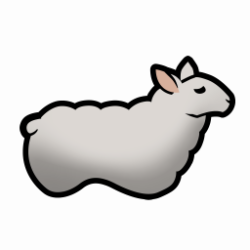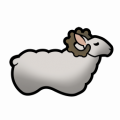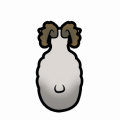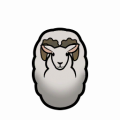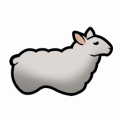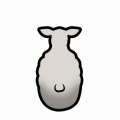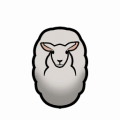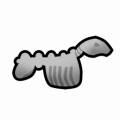Difference between revisions of "Sheep"
m (→Wool) |
m (→Analysis) |
||
| Line 72: | Line 72: | ||
Sheep have the highest wool / nutrition ratio of all animals. Sheep produce as much wool as [[alpaca]]s, but have a lower hunger rate. | Sheep have the highest wool / nutrition ratio of all animals. Sheep produce as much wool as [[alpaca]]s, but have a lower hunger rate. | ||
| − | An adult sheep eats {{#expr:{{#show:{{PAGENAME}}|?Real Hunger Rate}}/0.05}} [[hay]] per day, which would require {{#expr:{{#show:{{PAGENAME}}|?Real Hunger Rate}}/0.05/{{#show:Haygrass|?Harvest Yield Per Day (100)}} round 1}} tiles of [[haygrass]] to sustain. Sheep produce {{#expr: {{P|Wool Amount}} / {{P|Shearing Interval Days}}}} wool per day. The same {{#expr:{{#show:{{PAGENAME}}|?Real Hunger Rate}}/0.05/{{#show:Haygrass|?Harvest Yield Per Day (100)}} round 1}} tiles of [[cotton plant]] would produce {{#expr: 5.2 * {{#show:Cotton plant|?Harvest Yield Per Day (100)}} round 2}} units of cloth per day. Sheep wool is {{%|({{Q|Sheep wool|Market Value Base}} / {{Q|Cloth|Market Value Base}})-1 round 2}} more valuable per unit, making wool more profitable. This becomes further profitable if sheep are allowed to graze. | + | An adult sheep eats {{#expr:{{#show:{{PAGENAME}}|?Real Hunger Rate}}/0.05}} [[hay]] per day, which would require {{#expr:{{#show:{{PAGENAME}}|?Real Hunger Rate}}/0.05/{{#show:Haygrass|?Harvest Yield Per Day (100)}} round 1}} tiles of [[haygrass]] to sustain. Sheep produce {{icon small|Sheep wool}} {{#expr: {{P|Wool Amount}} / {{P|Shearing Interval Days}}}} wool per day. The same {{#expr:{{#show:{{PAGENAME}}|?Real Hunger Rate}}/0.05/{{#show:Haygrass|?Harvest Yield Per Day (100)}} round 1}} tiles of [[cotton plant]] would produce {{icon small|Cloth}} {{#expr: 5.2 * {{#show:Cotton plant|?Harvest Yield Per Day (100)}} round 2}} units of cloth per day. Sheep wool is {{%|({{Q|Sheep wool|Market Value Base}} / {{Q|Cloth|Market Value Base}})-1 round 2}} more valuable per unit, making wool more profitable. This becomes further profitable if sheep are allowed to graze. |
| − | However, [[textile]] supply usually isn't a problem. [[Cloth]] can be grown as long as its warm outside and there's soil around. Sheep are more efficient, but you'll have to ''buy'' or otherwise | + | However, [[textile]] supply usually isn't a problem. [[Cloth]] can be grown as long as its warm outside and there's soil around. Sheep are more efficient, but you'll have to ''buy'' (or otherwise get) sheep, which is an opportunity cost on its own. Sheep must also be sheared by an Animals handler, while cloth can be sown normally. If you don't have anyone good at Animals, sheep produce much less wool. |
== Training == | == Training == | ||
Revision as of 03:34, 28 February 2023
Sheep
Sheep husbandry is practised throughout the majority of the inhabited worlds, however only recently it has been introduced to the rimworlds. Domestic sheep are relatively small herbivores, usually with yellowish wool and medium sized horns.
Base Stats
- Type
- Animal
- Flammability
- 70%
Pawn Stats
- Move Speed
- 4.8 c/s
- Health Scale
- 70% HP
- Body Size
- 0.75
- Mass - Baby
- 9 kg
- Mass - Juvenile
- 22.5 kg
- Mass - Adult
- 45 kg
- Carrying Capacity
- 56 kg
- Filth Rate
- 8
- Hunger Rate
- 0.36 Nutrition/Day
- Diet
- herbivorous
- Life Expectancy
- 12 years
- Manhunter Chance
- 0%
- Manhunter Chance (Taming)
- 0%
- Trainable Intelligence
- None
- Wildness
- 0%
- Roam Interval
- 5 days
- Mate Interval
- 12 hours
- Maturity Age
- 0.333 years (20 days)
- Juvenile Age
- 0.25 years (15 days)
- Comfortable Temp Range
- -20 °C – 45 °C (-4 °F – 113 °F)
Production
- Meat Yield
- 105
 sheep meat
sheep meat - Leather Yield
- 33
 plainleather
plainleather - Wool Amount
- 45
 sheep wool
sheep wool - Shearing Interval
- 10 days
- Gestation Period
- 5.661 days
- Offspring Per Birth
- 1-2 (1.318 avg)
Melee Combat
- Attack 1
- Head
14 dmg (Blunt)
21 % AP
2.9 second cooldown - Attack 2
- Front left leg
6 dmg (Blunt)
9 % AP
2 second cooldown - Attack 3
- Front left leg
6 dmg (Poke)
9 % AP
2 second cooldown - Attack 4
- Front right leg
6 dmg (Blunt)
9 % AP
2 second cooldown - Attack 5
- Front right leg
6 dmg (Poke)
9 % AP
2 second cooldown - Attack 6
- Teeth
8 dmg (Bite)
12 % AP
2 second cooldown
0.5 chance factor - Average DPS
- 2.15
- tradeTags
- AnimalFarm, AnimalCommon
Sheep are easily tameable herbivores with a medium movement speed. Males of the species are referred to as Rams and can be distinguished by their rounded horns, while females are referred to as Ewes and lack horns. Babies of either gender appear identical to ewes and are referred to as Lambs.
Obtaining
Sheep can join the player in a random event, or bought from faction bases and from bulk goods traders. Sheep purchased from traders will be already tamed.
Summary
Sheep are pen animals. Once tamed, pen animals cannot and do not need to be trained any further. But if left outside of a pen or caravan hitching spot, pen animals will eventually roam outside your colony. Making a caravan is not required to tie animals to a caravan hitching spot.
Sheep can be sheared for ![]() 45 sheep wool (
45 sheep wool (![]() 121.5) every 10 days.
121.5) every 10 days.
Analysis
Wool
Sheep have the highest wool / nutrition ratio of all animals. Sheep produce as much wool as alpacas, but have a lower hunger rate.
An adult sheep eats 7.2 hay per day, which would require 5.2 tiles of haygrass to sustain. Sheep produce ![]() 4.5 wool per day. The same 5.2 tiles of cotton plant would produce
4.5 wool per day. The same 5.2 tiles of cotton plant would produce ![]() 3.54 units of cloth per day. Sheep wool is 80% more valuable per unit, making wool more profitable. This becomes further profitable if sheep are allowed to graze.
3.54 units of cloth per day. Sheep wool is 80% more valuable per unit, making wool more profitable. This becomes further profitable if sheep are allowed to graze.
However, textile supply usually isn't a problem. Cloth can be grown as long as its warm outside and there's soil around. Sheep are more efficient, but you'll have to buy (or otherwise get) sheep, which is an opportunity cost on its own. Sheep must also be sheared by an Animals handler, while cloth can be sown normally. If you don't have anyone good at Animals, sheep produce much less wool.
Training
This animal can be trained as follows:
| Guard: | |
|---|---|
| Attack: | |
| Rescue: | |
| Haul: | |
*As of version 1.1.2610, all animals can be tamed. The percentage of likelihood of success depends on factors such as the Animals Wildness Percentage, Pawn Handling Skill, and others. More information can be found on the animals page.
Health
Gallery
Version history
- 1.1.0 - Added as part of the integration of the Vanilla Animals Expanded - Livestock mod into the basegame.
